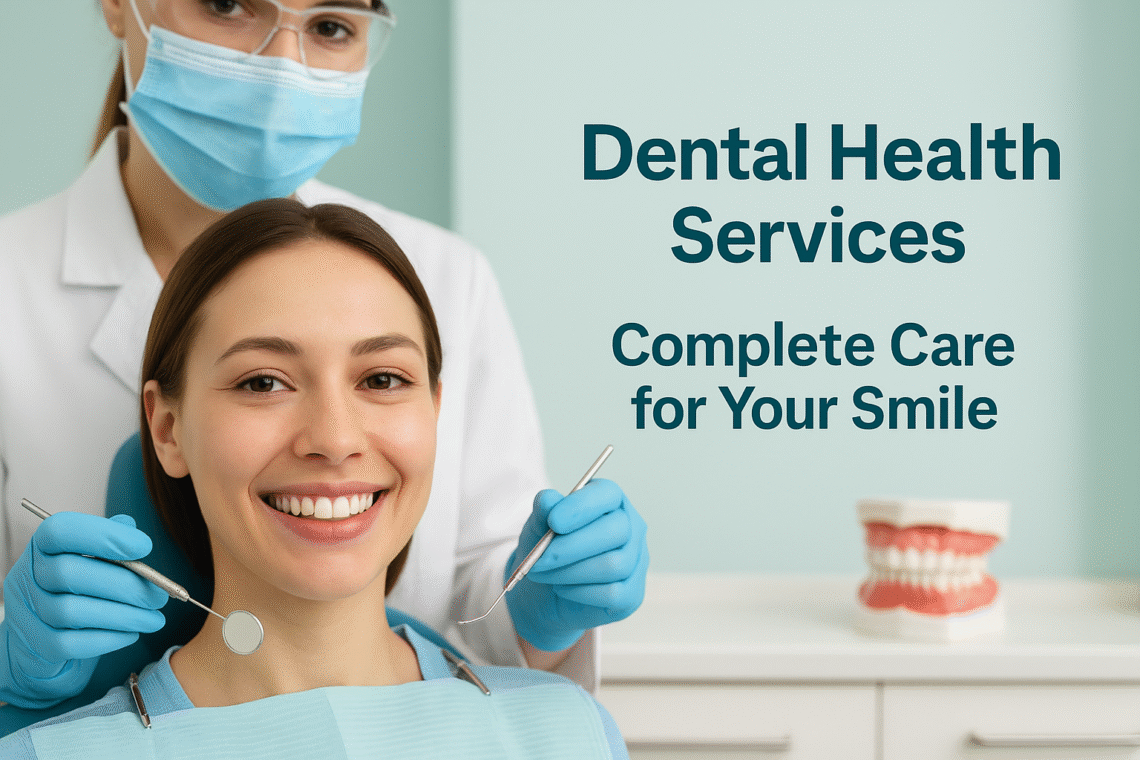In today’s fast-paced world, staying healthy is no longer just about avoiding illness—it’s about thriving in every area of life. Physical vitality, mental sharpness, and emotional balance are all essential components of true wellness. Yet with the constant demands of modern living, it’s easy to overlook the small choices that can make a big difference.
Fortunately, the journey to better health doesn’t require drastic changes. By taking simple, consistent actions every day—like eating well, staying active, and managing stress—you can dramatically improve your well-being over time. These habits form the foundation of a resilient, energized life.
In this comprehensive guide, we’ll explore the Top 8 practical tips to stay healthy, with a special focus on dental health services—an often underestimated yet vital part of your overall health. Your mouth is the gateway to your body, and good oral care can support everything from heart health to immune function.
Top 8 Tips on How to Stay Healthy
1. Eat a Balanced and Nutritious Diet

Your diet plays a fundamental role in shaping your overall Dental Health Services and well-being. What you eat daily directly impacts your energy levels, immune function, and even your mood. It’s not just about filling your stomach—it’s about fueling your body the right way.
Choosing nutrient-rich foods like fruits, vegetables, whole grains, lean proteins, and healthy fats gives your body the building blocks it needs to thrive. These foods provide essential vitamins, minerals, antioxidants, and fiber that support everything from brain function to heart health. A colorful plate is usually a good sign you’re getting a variety of nutrients.
Small changes can make a big difference. Swapping out processed foods for whole, nutrient-rich options not only improves your nutrition but also helps you feel more satisfied and energized. When your body gets the nourishment it needs, every system—inside and out—works better.
What to include:
- Fruits and vegetables: Aim for at least 5 servings a day. They’re packed with antioxidants, fiber, and water.
- Whole grains: Brown rice, oats, and whole wheat bread are high in fiber and help maintain healthy digestion.
- Lean protein: Sources like chicken, fish, beans, and tofu help build and repair tissues.
- Healthy fats: Nuts, seeds, olive oil, and avocados support brain function and heart health.
What to limit:
- Processed foods
- Sugary beverages
- Excessive sodium and saturated fats
Pro tip: Meal prepping for the week can help ensure you eat healthy even on your busiest days.
2. Floss Daily (Dental Health Services)
- Flossing removes plaque and food particles between teeth where brushes can’t reach.
- Use traditional floss or floss picks for easier handling.
- Make it a habit before bed to reduce the chance of plaque buildup overnight.
3. Eat a Tooth-Friendly Diet
- Limit sugary and acidic foods that cause cavities.
- Include foods rich in calcium and phosphorus (e.g., dairy, leafy greens).
- Drink plenty of water to rinse away debris and neutralize acids.
4. Visit the Dentist Regularly
- Schedule checkups and cleanings every six months.
- Early detection of problems leads to easier and less costly treatment.
- Talk to your dentist about any concerns—sensitivity, pain, or changes in your mouth.
5. Quit Smoking and Avoid Tobacco Products
- Smoking contributes to gum disease, tooth loss, and oral cancer.
- Quitting improves your overall health and enhances healing after dental procedures.
6. Use Mouthwash
- Antibacterial mouthwash helps reduce plaque and gum inflammation.
- Fluoride rinses strengthen enamel and prevent decay.
- Always follow your dentist’s recommendations regarding usage.
7. Protect Your Teeth (Dental Health Services)
- Wear a mouthguard during sports to prevent injury.
- Consider a nightguard if you grind your teeth while sleeping (bruxism).
- Avoid using your teeth as tools (like opening bottles or tearing packages).
8. Educate Your Family (Dental Health Services)
- Teach children good oral habits from an early age.
- Lead by example—your habits influence others.
- Monitor your child’s brushing until they’re able to do it well on their own.
Why Is Dental Health So Important?
Dental health is more important than many people realize. It’s not just about having clean teeth or a bright smile—it’s a vital part of your overall health. Your mouth is the entry point to your digestive and respiratory tracts, and poor oral hygiene can allow harmful bacteria to enter the body.
When dental health is neglected, it can lead to more than just cavities or gum disease. Inflammation and infections in the mouth have been linked to serious conditions such as heart disease, diabetes, respiratory infections, and even stroke. For pregnant women, poor oral health may increase the risk of complications like premature birth or low birth weight.
Maintaining good dental health isn’t just about brushing—it’s about protecting your entire body. Regular checkups, daily oral care, and a healthy lifestyle can reduce your risk of these complications and support your long-term well-being.
- Cardiovascular Disease: Gum disease increases the risk of heart problems.
- Diabetes: Gum disease can make it harder to control blood sugar levels.
- Respiratory Infections: Inhaling bacteria from infected teeth and gums can cause lung infections.
- Pregnancy Complications: Poor dental health has been linked to premature birth and low birth weight.
Additionally, dental problems can affect your ability to eat, speak, and even your self-esteem. A healthy mouth allows you to smile confidently and live comfortably.
Understanding Dental Health Services

Dental health services encompass everything from basic check-ups to advanced treatments aimed at preserving and improving your oral health. These services include preventive care like cleanings and fluoride treatments, which help stop problems before they start. Regular visits to the dentist ensure early detection of issues like cavities or gum disease, preventing more serious complications.
In addition to preventive care, dental health services also include restorative treatments such as fillings, crowns, root canals, and dentures. These procedures repair damaged teeth, relieve pain, and restore normal function, helping you eat and speak comfortably. Cosmetic services, like teeth whitening and veneers, further enhance the appearance of your smile and boost confidence.
Whether you need a routine cleaning or a complex procedure, accessing professional dental health services is essential for maintaining not just your oral hygiene but your overall health. A healthy smile truly reflects a healthy body.
1. Preventive Dental Services
Prevention is the foundation of good oral hygiene, and it plays a critical role in long-term Dental Health Services. The goal is to stop dental issues like cavities, gum disease, and enamel erosion before they start. Preventive care not only saves time and money but also helps maintain a healthy, confident smile for life.
Key Dental Health Services that fall under prevention include regular check-ups, professional cleanings, fluoride treatments, dental sealants, and patient education. These services help detect early signs of potential problems and remove plaque buildup that daily brushing may miss. Dentists also provide personalized advice to improve your home care routine.
By focusing on prevention, you minimize the need for more invasive and costly procedures in the future. Consistent visits to your dentist, combined with proper brushing, flossing, and a balanced diet, form the core of effective Dental Health Services. Prevention truly is the smartest strategy for lifelong oral health.:
- Routine Cleanings and Checkups: Every 6 months, dental hygienists clean your teeth to remove plaque and tartar, and dentists check for signs of decay or disease.
- Dental Sealants: Thin coatings applied to molars to protect against cavities, especially in children.
- Fluoride Treatments: Strengthens enamel and helps prevent tooth decay.
- Oral Cancer Screenings: Early detection of oral cancer can be life-saving.
- Education and Counseling: Nutritional advice, smoking cessation, and proper oral hygiene instruction.
2. Diagnostic Services
These help identify existing or developing oral health problems:
- X-rays (Radiographs): Reveal hidden cavities, impacted teeth, bone loss, and more.
- Digital Imaging: Advanced tools like CBCT scans give detailed 3D images of your teeth and jaw.
- Comprehensive Oral Exams: A thorough evaluation of your mouth, head, and neck by your dentist.
3. Restorative Dental Services
Restorative treatments play a crucial role in maintaining long-term oral health. These procedures are designed to restore the structure and function of teeth that have been damaged by decay, trauma, or disease. Whether it’s a small cavity or a severely broken tooth, modern Dental Health Services offer effective solutions to bring your smile back to life.
Common restorative treatments include fillings, crowns, bridges, and implants. Fillings are used to repair minor decay, while crowns cover and strengthen damaged teeth. Bridges and dental implants replace missing teeth, restoring your ability to chew and speak properly. These Dental Health Services not only improve oral function but also enhance the appearance of your smile, boosting confidence and quality of life.
By choosing timely and professional Dental Health Services, you can prevent further complications and avoid more extensive treatments in the future. Regular dental visits and early intervention are key to keeping your teeth healthy, strong, and functional for years to come:
- Fillings: Used to restore cavities using materials like composite resin or amalgam.
- Crowns and Bridges: Restore damaged or missing teeth.
- Root Canals: Treat infected pulp inside a tooth, saving it from extraction.
- Dentures and Implants: Replace missing teeth for functional and aesthetic purposes.
4. Cosmetic Dentistry

Improves the appearance of your teeth and smile:
- Teeth Whitening: Removes stains and discoloration.
- Veneers: Thin shells bonded to the front of teeth to improve shape, size, and color.
- Bonding: Repairs chips and gaps using tooth-colored resin.
- Smile Makeovers: A combination of procedures customized to enhance your smile.
5. Orthodontic Services
Corrects misalignment of teeth and jaws:
- Braces (Metal or Ceramic): Straighten teeth using brackets and wires.
- Clear Aligners (e.g., Invisalign): Removable, nearly invisible trays.
- Retainers: Maintain tooth position after treatment.
6. Periodontal (Gum) Services
Focuses on preventing and treating gum disease:
- Scaling and Root Planing: Deep cleaning to remove plaque from below the gumline.
- Periodontal Surgery: Treats severe gum disease or corrects gum recession.
- Laser Therapy: Minimally invasive treatment for infected gum tissue.
7. Pediatric Dentistry
Specialized care for children and adolescents:
- Preventive Care: Cleanings, fluoride, and sealants.
- Education: Teaching proper brushing and flossing.
- Growth Monitoring: Keeping track of dental development and alignment.
8. Emergency Dental Services
Available for urgent issues such as:
- Toothaches
- Broken or knocked-out teeth
- Infections or abscesses
- Bleeding or swelling
Conclusion: A Lifetime of Smiles Starts with You
Your smile is one of your most valuable assets—it reflects your health, confidence, and personality. Maintaining that smile for a lifetime begins with you and the choices you make every day. While brushing and flossing are essential, long-term oral health requires a deeper commitment. That’s where professional Dental Health Services come in, offering the care, tools, and expertise needed to protect your teeth and gums at every stage of life.
From preventive cleanings and exams to advanced treatments like fillings, root canals, and orthodontics, Dental Health Services provide comprehensive care tailored to your individual needs. Regular dental check-ups allow professionals to catch problems early, saving you from pain, discomfort, and costly procedures in the future. Preventive services like fluoride treatments, sealants, and digital x-rays play a crucial role in safeguarding your oral health.
But maintaining a lifetime of smiles isn’t just about visiting the dentist—it’s about creating habits that support overall well-being. Eating a balanced diet, avoiding sugary snacks, staying hydrated, and quitting tobacco are all essential steps toward better oral and overall health. Your dentist can be your partner in this journey, offering guidance, education, and personalized care every step of the way.
Dental care doesn’t end with children or seniors—it’s a lifelong responsibility. As your mouth changes with age, your Dental Health Services should evolve too. Teenagers may need braces, adults may require crowns or implants, and older adults may face challenges like gum recession or dry mouth. Whatever the stage, regular dental care ensures your mouth stays healthy and your smile stays strong.
In conclusion, a healthy, beautiful smile doesn’t happen by chance—it’s the result of smart choices, daily care, and professional support. Investing in Dental Health Services now means fewer dental issues later, greater confidence, and a better quality of life. Your smile is worth protecting, and the responsibility starts with you.
So take charge of your oral health today. Schedule that check-up, follow a solid hygiene routine, and commit to habits that support your lifelong wellness. Because a confident, radiant smile isn’t just about teeth—it’s about how you care for yourself every day. A lifetime of smiles truly starts with you.
Final Thoughts (Dental Health Services)

Dental health is more than just having a bright smile—it’s a critical part of your overall well-being. Your mouth is the gateway to your body, and the health of your teeth and gums can influence everything from digestion to heart health. That’s why Dental Health Services are so important—they provide the professional care and preventive attention necessary to keep your mouth healthy for life.
From childhood through adulthood, your dental needs evolve. Regular check-ups, cleanings, fluoride treatments, and sealants during your younger years lay the foundation for strong, healthy teeth. As you age, these Dental Health Services expand to include more personalized care, such as gum disease treatment, fillings, crowns, implants, and more. No matter your age, maintaining regular visits to the dentist is essential to detect and treat problems before they become serious.
One of the most powerful aspects of dental care is prevention. Routine exams allow dentists to catch early signs of tooth decay, gum disease, or other oral conditions before they cause pain or permanent damage. Preventive services like cleanings and education on proper brushing and flossing techniques go a long way in maintaining a healthy smile. These services help reduce the need for complex procedures down the road, saving you time, money, and discomfort.
Modern Dental Health Services are more advanced and accessible than ever before. With digital imaging, minimally invasive treatments, and personalized patient care, dental visits have become more comfortable and efficient. Whether you’re receiving a basic cleaning or undergoing a full-mouth restoration, today’s dental care is designed to make your experience as smooth and effective as possible.
Beyond the clinical treatments, dental professionals play a vital role in helping you build healthy habits at home. They offer guidance on proper oral hygiene, nutrition, and lifestyle choices that support long-term dental health. They are your partners in preventing problems, managing conditions, and improving the appearance and function of your smile.
In conclusion, taking care of your oral health is an investment in your overall health and confidence. By staying proactive and making regular use of Dental Health Services, you’re not just protecting your teeth—you’re safeguarding your future. Your smile is one of your most valuable assets, and it deserves expert care and consistent attention.
So, take that extra step—schedule your check-up, ask questions, and commit to a daily routine. With the right care and commitment, you can enjoy a lifetime of healthy smiles.
FAQs: Dental Health Services
Q1: How often should I visit the dentist?
A: It’s generally recommended to visit the dentist every 6 months for routine cleanings and check-ups. However, your dentist may suggest more frequent visits based on your oral health needs.
Q2: Are dental check-ups really necessary if I brush and floss daily?
A: Yes. Brushing and flossing are essential, but only a professional cleaning can remove hardened plaque (tartar) and detect problems early—before they become serious.
Q3: What are the most common dental health services?
A: Common services include cleanings, fillings, crowns, root canals, gum treatments, teeth whitening, and orthodontics like braces or clear aligners.
Q4: Are dental x-rays safe?
A: Dental x-rays use very low levels of radiation and are considered safe for both children and adults. They are important for spotting hidden dental issues.
Q5: What can I do to prevent cavities and gum disease?
A: Brush twice a day with fluoride toothpaste, floss daily, eat a balanced diet, avoid sugary snacks, and schedule regular dental visits.
Q6: Are cosmetic dental procedures covered by insurance?
A: Most cosmetic procedures like whitening or veneers are not covered, but it depends on your plan. Always check with your provider first.
Dental Health Services: Complete Care for Your Smile





